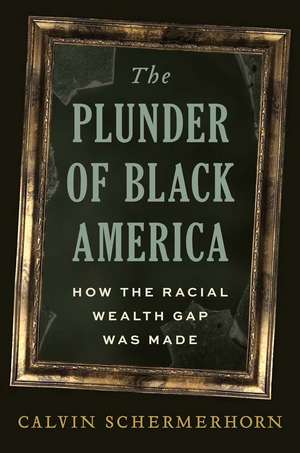The Plunder of Black America: How the Racial Wealth Gap Was Made
Autor Calvin Schermerhornen Limba Engleză Hardback – 11 feb 2025
Wealth is central to the American pursuit of happiness and is an overriding measure of well-being. Yet wealth is conspicuously absent from African American households. Why do some 3.5 million Black American families have zero or negative wealth?
Historian Calvin Schermerhorn traces four hundred years of Black dispossession and decapitalization—what Frederick Douglass called plunder—through the stories of families who have strived to earn and keep the fruits of their toils. Their struggles reveal that the ever-evolving strategies to strip Black income and wealth have been critical to sustaining a structure of racialized disadvantage. These accounts also tell of the quiet heroism of those who worked to overcome obstacles and defy the plunder.
From the story of Anthony and Mary Johnson, abducted from Angola and brought to Virginia in 1619, to the enslaved Black workers dispossessed by the Custis-Washington family, to Venture Smith (born Broteer Furro), who purchased his freedom, to three generations of a family enslaved in the South who moved north after Emancipation, to the Tulsa massacre and the subprime lending crisis, Schermerhorn shows that we cannot reckon with today’s racial wealth inequality without understanding its unrelenting role in American history.
Preț: 179.97 lei
Nou
Puncte Express: 270
Preț estimativ în valută:
34.44€ • 35.75$ • 28.72£
34.44€ • 35.75$ • 28.72£
Carte disponibilă
Livrare economică 03-17 martie
Preluare comenzi: 021 569.72.76
Specificații
ISBN-13: 9780300258950
ISBN-10: 030025895X
Pagini: 304
Ilustrații: 6 b-w illus.
Dimensiuni: 156 x 235 mm
Greutate: 0.58 kg
Editura: Yale University Press
Colecția Yale University Press
ISBN-10: 030025895X
Pagini: 304
Ilustrații: 6 b-w illus.
Dimensiuni: 156 x 235 mm
Greutate: 0.58 kg
Editura: Yale University Press
Colecția Yale University Press
Recenzii
“A carefully researched work of history that chronicles centuries of injustice while calling for an end to inequality.”—Kirkus Reviews
“Calvin Schermerhorn’s The Plunder of Black America demands the attention of the global academy by combining a wide array of secondary literature with deep analysis of new primary sources. It is essential reading for anyone concerned with the past, present, and future of wealth, poverty, and racial injustice.”—Walter D. Greason, Macalester College
“Never reducing Black lives to mere numbers, Calvin Schermerhorn has given readers an intimate look at the effects of the racial ‘wealth gap,’ as well as the determination and spirit of those individuals struggling against it.”—Carole Emberton, author of To Walk About in Freedom: The Long Emancipation of Priscilla Joyner
“Schermerhorn sets out in clear and exquisite detail the huge obstacles placed in the path of African Americans who simply wanted to become self-sufficient and leave their children with brighter futures. He also provides us with hope, by describing a variety of innovative solutions.”—Dorothy A. Brown, author of The Whiteness of Wealth: How the Tax System Impoverishes Black Americans—And How We Can Fix It
“A triumph and a startling revelation. Schermerhorn exposes that the racial wealth gap is persistent and pernicious—and it, in fact, has a history. This should be required reading.”—Justene Hill Edwards, University of Virginia, author of Savings and Trust: The Rise and Betrayal of the Freedman’s Bank
“Writing with remarkable clarity, insight and force, Schermerhorn depicts the theft of Black wealth that has for centuries and to this day undermined the progress of Black Americans. These powerful, tragic and deeply researched stories reveal a complex and often invisible history. For anyone who seeks to genuinely understand the history of America and the truth of inequality, Calvin Schermerhorn’s brilliant The Plunder of Black America is a necessary addition to your bookshelf.—Steven Beschloss, director, Narrative Storytelling Initiative
“Calvin Schermerhorn’s The Plunder of Black America demands the attention of the global academy by combining a wide array of secondary literature with deep analysis of new primary sources. It is essential reading for anyone concerned with the past, present, and future of wealth, poverty, and racial injustice.”—Walter D. Greason, Macalester College
“Never reducing Black lives to mere numbers, Calvin Schermerhorn has given readers an intimate look at the effects of the racial ‘wealth gap,’ as well as the determination and spirit of those individuals struggling against it.”—Carole Emberton, author of To Walk About in Freedom: The Long Emancipation of Priscilla Joyner
“Schermerhorn sets out in clear and exquisite detail the huge obstacles placed in the path of African Americans who simply wanted to become self-sufficient and leave their children with brighter futures. He also provides us with hope, by describing a variety of innovative solutions.”—Dorothy A. Brown, author of The Whiteness of Wealth: How the Tax System Impoverishes Black Americans—And How We Can Fix It
“A triumph and a startling revelation. Schermerhorn exposes that the racial wealth gap is persistent and pernicious—and it, in fact, has a history. This should be required reading.”—Justene Hill Edwards, University of Virginia, author of Savings and Trust: The Rise and Betrayal of the Freedman’s Bank
“Writing with remarkable clarity, insight and force, Schermerhorn depicts the theft of Black wealth that has for centuries and to this day undermined the progress of Black Americans. These powerful, tragic and deeply researched stories reveal a complex and often invisible history. For anyone who seeks to genuinely understand the history of America and the truth of inequality, Calvin Schermerhorn’s brilliant The Plunder of Black America is a necessary addition to your bookshelf.—Steven Beschloss, director, Narrative Storytelling Initiative
Notă biografică
Calvin Schermerhorn is a professor of history in the School of Historical, Philosophical, and Religious Studies at Arizona State University. His books include The Business of Slavery and the Rise of American Capitalism, 1815–1860, and Unrequited Toil: A History of United States Slavery. He lives in Tempe, AZ.
